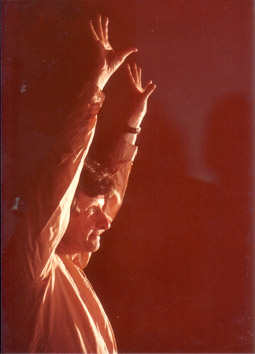obituary: jean-pierre voos
clare grant

Jean-Pierre Voos
AS FOR SO MANY PEOPLE, I IMAGINE, NEWS OF THE DEATH OF JEAN-PIERRE VOOS WAS SO IMPROBABLE I HAD TO HEAR IT FROM SEVERAL QUARTERS BEFORE I COULD MAKE IT REAL. THE MASTER OF THE SURVIVAL STRATEGY AND CREATOR OF EVER-NEW BEGINNINGS COULD LEAD YOU TO BELIEVE HE WOULD ALWAYS FIND A NEW OPENING, THAT HE WOULD DREAM UP ANOTHER ANGLE IN EVERY CRISIS. HIS PROPENSITY FOR TRAVEL, ADVENTURE AND NEW STARTS MAY HAVE BEEN TRIGGERED WHEN, HAVING BEEN BORN IN FRANCE, HE TRAVELLED WITH HIS MOTHER ON A PRECARIOUS JOURNEY TO ENGLAND IN THE MIDST OF WWII. HE GREW UP THERE UNDERTAKING HIS OWN FIRST TRAINING IN THEATRE. HE DIED ON JANUARY 17 AT 76 YEARS OF AGE, OF COMPLICATIONS FROM A LUNG INFECTION IN TOWNSVILLE, WHERE HE HAD SPENT THE LAST 25 YEARS, SETTING UP, FIRST, TROPIC LINE AND THEN TROPIC SUN THEATRE, IN ASSOCIATION WITH JAMES COOK UNIVERSITY.
I first met Jean-Pierre in a workshop with his company, KISS Theatre Group, renamed Kangaroos In Silk Stockings to avoid some never-quite-explained bureaucratic hassle in Holland, when he took 13 or so rookie Australians back there in 1983, the previous company having dispersed in Australia. But the name soon reverted to KISS. My first image of him is of his sharp profile as he swept into the church hall in Paddington, his piercing eyes focused intently forward as he went past. That intent focus never seemed to flag.
Jean-Pierre was driven by the work of some of the most rigorous practitioners of the 20th century—Artaud, Grotowski, the Living Theatre and the Tanztheater of Pina Bausch. Taking on board the full implications of the aesthetic, physical and personal rigours at the heart of these ideas was never going to be easy: the relentless need to find spaces, to hone the bodies of his company and maintain a touring/performing program was a constant reality. It shouldn’t have been surprising that at times the often blistering tongue challenged some of our most cherished beliefs and comfortable assumptions. Nor would anyone who experienced this not also have felt themselves stronger and the more self-reliant for it. Pretty soon the glittering mind, straightforward charm and grace would reappear and a new idea of the possible would emerge.
Always intensely committed to the experience of the audience, Jean-Pierre might be said to have been postmodern before his time: the de-centred narratives; the rigorous deconstruction of the classics, of which his knowledge was profound; the location of meaning in the body (while retaining an intense joy in the function and beauty of the word and a fascinating sense of the relation of logocentric and physical images); the training of the voice for sound rather than diction or expression, without losing sight of either in his productions; and the use of theatrical devices to create sense and experience, such as the performers’ 20-minute Sufi spin as brilliant halogen lights blasted the audience into a space that might be celestial in Spheres, his version of Dante’s Paradiso.
As Sue Rider says in her tribute on the Tropic Sun Theatre website [www.tropicsun.com.au/history/jp-tribute.html], Jean-Pierre was a great survivor. Other tributes reflect the impact his work has had both in Australia, where KISS, had performed several times before I joined it in 1983, and in Europe, where the company had led a peripatetic life in France, Switzerland and Scandinavia. He settled KISS in Holland for the last few years of its 15-year existence, and I worked with him there from 1983 to 1985, the last two years of the company’s life. Tributes emphasise his “ceaseless passion”, his readiness for adventure, his single-minded focus on the actor’s body and imagination as the source of new images and new performance modes. Theatre was the central preoccupation of his phenomenal life.
Jean-Pierre’s influence has penetrated the lives of a great number of people—supporters of the theatre as much as makers and performers, of whom many are still prominent members of the Australian theatre community. His grace, intelligence and charm always drew a wide circle of informed and active ‘patrons’ around his company’s work, as he sustained the ongoing need to accommodate and consolidate a shifting band of performers, finding homes and work spaces wherever possible and building performance skills that have seeped into the practices of many Australian artists. He made theatre that, like the companies and artists that most deeply inspired Jean-Pierre himself, challenged assumptions about the role of art in the community and the way its makers have to live to create that work.
Apart from his vision, his love of classics, his soup and wine-making and his innate sense of theatre, it was his ability to constantly renew his life, and his work and yet, paradoxically, not to change; that makes news of the death of Jean-Pierre Voos so inconceivable.
RealTime issue #83 Feb-March 2008 pg. 39






